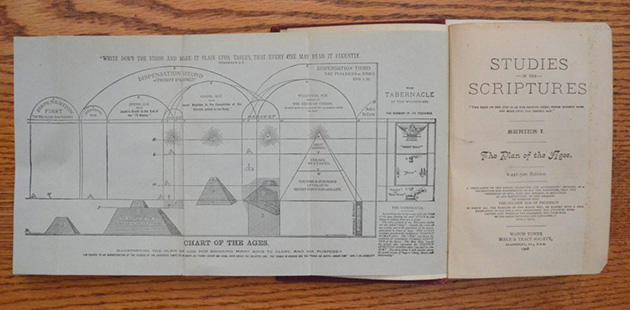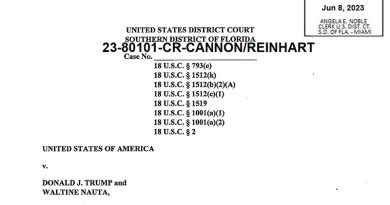Christian Author Ron Rhodes Offers Views on Bible Prophecy, End Times
Pyramid theology foldout “Chart of the Ages” from the 1908 Watch Tower Bible and Tract Society publication Studies in the Scriptures Vol I “The Divine Plan of the Ages.” (credit Anthony C. Hayes)
In his discourse on the Mount of Olives, Jesus speaks about His Second Coming and the signs of the last days and warns his disciples, “See to it that no one deceives you.” Jesus then lists a series of sobering events which would earmark the end of the age. Two thousand years later – with relentless wars, earthquakes and famines in various places, political upheaval, alarming hatred of “the other”, and a world-wide pandemic – many wonder if we are finally on this long-predicted precipice.
Author Ron Rhodes has been considering the signs of the end times since he was a teen. Rhodes has written over 85 books, which have sold in the millions and are translated into numerous languages. But unlike some sensationalists who have seized upon one “sign” or another to captivate a credulous crowd, Rhodes has always championed a reasonable approach to understanding the Word of God. We recently spoke with Rhodes about his life and conversion to Bible-based Christianity; his views on cataclysmic cults, the malevolent Antichrist, and Israel; happenings he believes are clear signs of a coming apocalypse; and about his latest books, Basic Bible Prophecy and Spiritual Warfare in the End Times (Harvest House).
This is the first part of a three-part interview.
BPE: This may be an odd place to start a discussion about the end of the world, but I just recently learned that, back in the 60s and 70s, you were a member of “The Rhodes Kids” singing group.
Rhodes: That’s correct. During those years, we did a lot of network television shows like the Mike Douglas Show, Merv Griffin, Dinah Shore, American Bandstand, Jack Paar, The Jerry Lewis Telethon and so forth. Our recordings were playing on about 80% of the stations in the US. We had a pretty good record deal and performed all over the country.

It was during that time that we did some performances with Pat Boone and his family. That was fun – not only performance wise – but because we also talked about Bible prophecy. Pat and Shirley were just getting into it and had Bible studies back stage, so that is kind of what piqued my interest. It’s funny how that works.
BPE: Eventually you left the music business?
Rhodes: My brother Gary is still in music and has won all kinds of awards. The rest of the family is doing normal stuff, like being moms and dads. I, as you know, moved on to Christian apologetics and a writing career.
BPE: You mentioned how Pat and Shirley Boone’s interest in Bible prophecy piqued your interest as well. Was there any connection there with the excitement generated by Hal Lindsey’s book The Late Great Planet Earth?
Rhodes: Yeah, absolutely. That was around the time when that book became really huge. I didn’t know at the time that I would later meet Hal and talk with him about Bible prophecy, when I was working as a co-host of the nationally syndicated radio show, “The Bible Answer Man.” The Late Great Planet Earth popularized Bible prophecy. I don’t know if you remember, but following the publication of that book, there were literally dozens of other prophecy books that got published by riding the coattails of Hal’s book.
BPE: Like Salem Kirban’s 666?
Rhodes: Right. I remember reading that one, too. Hal told me later that he had a horrible publishing contract, and even though the book sold countless millions of copies, he hardly made any money on it.
BPE: Didn’t the New York Times list The Late Great Planet Earth as the most important nonfiction book of the 70s?

Rhodes: That may be, but I do remember reading it. The thing of it is, at that time, I had been attending a very liberal church. Now, for some of your readers, there is a discernible difference between liberal and conservative churches.
On the liberal side are those who believe that we mainly ought to try to be good and improve society; that the Bible is not really the word of God. It’s simply a book written by men, so it’s got mistakes in it. But it still presents good principles to live by. Some on the liberal side will even say that Jesus was not God; that Jesus didn’t die on the cross for our sins; and that there are many ways to attain salvation.
That’s actually the kind of church I grew up in.
So when I came across Hal Lindsay’s book, that was a game changer for me, because of how it comes from the position that the Bible is in fact the Word of God. I guess that’s a fundamental decision most people have to make at some point in their life. Is the Bible the Word of God, or is the Bible just a man-made book?
What got my personal attention is that the Bible is loaded with prophecies. And when you look at all the prophecies of the Old Testament that were fulfilled in New Testament times – such as the prophecies of Jesus coming as the Messiah – we’re talking about literally hundreds of prophecies that were fulfilled. So to me, the very fact that all of those prophecies came to pass indicated that God was involved. And since all of those prophecies were found in the Bible, that kind of put an exclamation point on the reality that the Bible really is divine – that it really is the word of God.
BPE: I assume when you talk about the Old Testament prophecies about Jesus being fulfilled, you’re including well-known Messianic verses, like Isaiah 7:14 and Micah 5:2?
Rhodes: Yeah, Isaiah 7:14 – he’d be born of a virgin; is from the line of Abraham – Genesis 12; from the line of David – Second Samuel 7; born in Bethlehem – Micah 5:2. He would be pierced for us – Zechariah 12:10 and would die for our sins – Isaiah 53. It’s said there are between 100-300 (messianic) prophecies, but that hinges on how you calculate what is a prophecy.
Some prophecies actually contained three or four prophecies within one sentence, so people will calculate each one of those as an individual prophecy. Prophetically speaking, that’s one of the reasons why people look to the Bible today, as it may pertain to the Second Coming of Christ. The idea is that, if all those prophecies of the First Coming came to pass quite literally, does that mean that the Second Coming prophecies will come to pass literally too? I’m of the opinion that they will.
BPE: Do you believe, as some do, that certain Bible prophecies may have both an imminent and a distant/future application?
Rhodes: Some prophecies are like that – others are not. An example would be the fact that some passages make reference to both the First and the Second Coming within one prophecy. But there’s no indication within that prophecy that there is actually a gap in between. For example, the prophecy might say that Jesus will ride into Jerusalem on a donkey, with people singing Hosanna. And then it will go on in the later part of that prophecy and say that Jesus’s kingdom will be worldwide. Well, that’s obviously talking about the Second Coming, after which Christ sets up His kingdom. So there you have prophecies of the First and the Second Coming of Christ in a single verse. So that’s something that you have to keep in mind when you’re interpreting prophecies.
To me, it best makes sense to let scripture interpret scripture. The idea there is that scripture is its own commentary. You don’t take one verse in isolation. Rather, you take all the verses that deal with a particular issue, and you try to come up with a cohesive view which honors all of those different verses. That’s what I’ve done.
A pretty simple working principle that I often tell people to use is: ‘When the plain sense makes good sense, seek no other sense, less you end up in nonsense.’
Frankly, there is a lot of nonsense out there.
BPE: How so?
Rhodes: There are loads of people today taking very bizarre, extreme views. And every time some little thing happens somewhere, it’s immediately claimed to be a fulfillment of one Bible prophecy or another. Or they try to set dates as to when things are going to happen. That is something people should never do.
BPE: But you’ll grant that gleaning questionable views from Bible prophecy is nothing new? On the outside of what most would consider orthodox Christianity, you had people like Joseph Smith of the Mormons and Charles Taze Russell of the Watchtower Society, who made prognostications based upon their interpretations of the Bible. Then you had ostensibly orthodox Christian ministers, such as William Miller in the mid-1800s, whose failed Millerite movement later gave rise to the teachings of Russell, the Shakers, and others. And just a few years ago, Harold Camping, a well known Bible teacher with a nationwide radio audience, set several erroneous dates for the end of the world.
Rhodes: Well, it’s important to draw a distinction between some of the groups you just mentioned.

It is true that the Jehovah’s Witnesses have set forth prophecies. But a lot of those later prophecies are based upon a particular version of the Bible called the New World Translation. That’s a Watchtower Society translation that supports their theology. So they don’t derive their theology from a standard Bible, rather, they took their theology and made a new version of the Bible to support their views.
What the Watchtower Society has done for many, many years is that they have used prophecy as a means of growth. You see, if people think that the end of the world is right around the corner, well, then you better hook up with the true group on earth. And for decades, that’s exactly what they have done.
But a great many of those “prophecies” have actually come from the governing body of the Watchtower.
The governing body is just a few men at the top, who determine the things that will be taught to Jehovah’s Witnesses. It’s mostly the governing body that has put together all those teaching books they publish, and a lot of their end times prophecies are found in those books.
Mormons, on the other hand, believe that the President of the Mormon church can make prophetic statements that are just as authoritative as the Bible. So for example, you had Joseph Smith saying in the 1830s that the New Jerusalem was about to be built right here in the United States.
Of course, those things never happened.
The test of a true biblical prophet is 100% accuracy. But these groups, like Jehovah’s Witnesses and the Mormons, have prophecies that never came to pass.
That should tell you something.
Now these other guys that you mentioned, like Harold Camping and William Miller, used some pretty bizarre schemes to come up with their dates. They thought that, by picking historic events, and going through some calculations with various calendars, they could come up with the exact date of the rapture of the church. When one date didn’t pan out, another date was chosen. It was wrong, too.
Here’s the thing.
Jesus said that no one knows the day or the hour. So why is it that human beings are so fixated on trying to come up with dates? Jesus said we wouldn’t know those dates.
BPE: And yet people continually get caught up with ‘date setting’?
Rhodes: I think it’s really important to understand that people make decisions for their lives based upon their understanding of Scripture. And if you’ve got these individuals out there setting dates, credulous followers might put off going to college. They might put off saving for retirement. Or they might spend all their money buying guns and building a bomb shelter in the mountains.
I think it’s a very serious thing what these (false prophets) have done. That’s why in my books, I always state explicitly that we cannot set dates and shouldn’t even attempt to. In fact, I always tell people to plan your life like it will be here your full lifetime expectancy, but live your life like the Lord could come today.
BPE: Your ministry is called ‘Reasoning from the Scriptures’. Have you ever been concerned there might be some confusion amongst casual readers by the fact that Reasoning from the Scriptures is also a Watchtower title?

Rhodes: Well, yes, the Watchtower came up with a book called Reasoning from the Scriptures, and my ministry was initially solely about apologetics. What I did was, I wrote a book called Reasoning from the Scriptures with Jehovah’s Witnesses.
BPE: So it’s a scholarly rebuttal to the Watchtower publication?
Rhodes: Exactly. You see, I had access to all their training materials. Everything that they use to train their people to go door to door. So I answered them point by point and put (these rebuttals) in this big book. It’s something like 450 pages long. I remember having to talk the publisher (Harvest House) into it, because they were kind of thinking, “Well, a big fat book like that on the Jehovah’s Witnesses? Who’s gonna want to buy that?” It turned out to be this huge bestseller, and it still continues to sell about as many copies per month as it did upon its initial release back in the 80s.
BPE: That led Harvest House to publish other ‘Reasoning…’ books?
Rhodes: There was a series of other books: Reasoning from the Scriptures with Mormons; …the Masons; and some other groups.
BPE: Your ministry expanded from that time to include areas beyond apologetics?
Rhodes: Yes, it did. I mean, answers are the heart of apologetics. But a biblical apologist goes beyond just having answers. He also lives the message. The biblical apologist is so committed to Christ that it shows in the way he lives. So we emphasize spirituality and a deeper walk with Christ.
Just think about it: if a person comes up to you and gives you a bunch of Bible answers, but he has a spiritual chip on the shoulder – he’s very arrogant and prideful – would that make much of an impact on you?
Probably not.
But if you have a really godly person, who was very clearly committed to walking with God – and you can see that in the way that he lives, the words that he uses, and the choices that he makes – then strong answers coming from that person mean something.
(To be continued with Part II on Monday)
© Copyright 2021 Baltimore Post-Examiner. All Rights Reserved

Anthony C. Hayes is an actor, author, raconteur, rapscallion and bon vivant. A former reporter at The Washington Herald and an occasional contributor to the Voice of Baltimore, Tony’s poetry, humor and prose have also been featured in Smile, Hon, You’re in Baltimore; Magic Octopus Magazine; Destination Maryland, and Tales of Blood and Roses.



